In this article, we’ll look at the differences between Fitbit and Oura Ring to help you find the best device for your sleep tracking needs.
Most importantly, you only have so many fingers for a smart ring and wrists for a fitbit on your body so you need to choose your wearable trackers wisely here.
And, there are no affiliate links in this article to these products because I’m not here for affiliate marketing.
What is the Oura Ring?
The Oura Ring is a smart ring that offers advanced sleep tracking and insights. Oura ring measures different aspects of sleep, such as total time asleep, REM cycles, and stages of sleep. Additionally, Oura ring tracks daily activities and provides feedback to help users make better choices when it comes to their wellbeing.
The oura ring tracks all these data and pops them into your oura app (hence it’s a smart ring, unlike the ring Frodo wore in Lord of the Rings which was a death/magical ring).
Oura ring sleep tracking provides a lot of colorful screen shots for you like these:
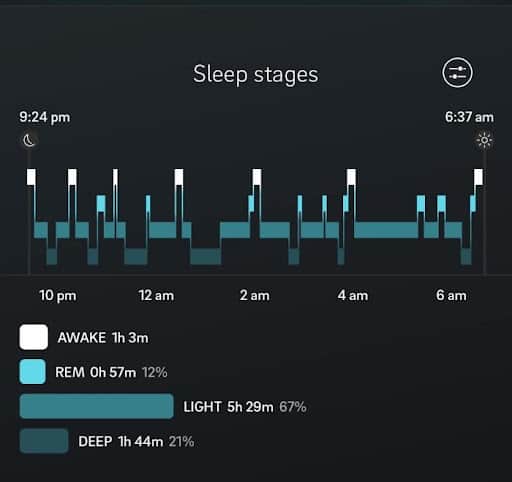
And don’t worry, if you have a waterbed, there is an oura ring waterproof variant.
How does the Oura Ring work?
The Oura Ring is designed to measure your body temperature, heart rate variability (HRV), and movement throughout the night. Oura ring uses these measures to track many sleep metrics such as sleep quality. Additionally, oura ring metrics such as total time asleep, REM cycles per night, and wake after sleep onset (WASO) times.
This is accomplished through tracking movement, blood oxygen saturation, and HRV via the infrared sensor in the oura ring.
Let’s define some sleep terms before moving on:
Total time asleep
Self explanatory, but let’s not miss anything, okay?
This is the total amount of time you were actually asleep during the night.
Ideally you get somewhere between 7-9 hours of sleep a night.
The importance of this metric is to calculate something known as sleep efficiency which is simply time asleep divided by time in bed.
Ideally, you want this greater than 90%. Numbers lower than this indicate a problem with WASO.
Deep sleep percentage
This is a measure of how much of your sleep was spent in this stage, which is the deepest and most restorative stage of non-REM (NREM) sleep.
REM cycles
These are short periods during which your eyes move quickly and your brain is active.
WASO
Is the time spent awake in between sleep cycles.
Sleep onset
This is another critical metric and represents the time it takes you to fall asleep. This is also known as sleep latency
Here’s a snapshot of how oura ring displays this
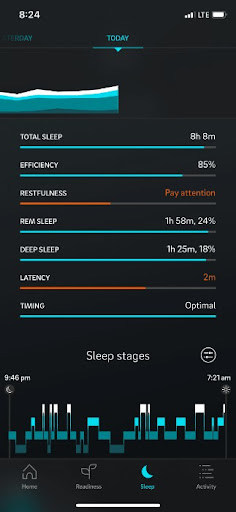
Sleep Score
Then you get an overall sleep score based on a combination of the above metrics. In other words, oura ring (through its companion app) takes your sleep data, does some fancy math, and spits out an overall sleep score.
Sleep scores in the range of 85-100 are considered excellent and sleep scores below that indicate various levels of poor sleep.
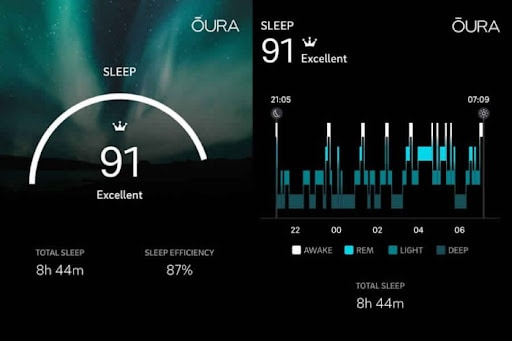
Ideally, you track your overall sleep score over time in correlation to what you’re doing throughout the day. And this is what helps you improve your sleep.
Now, given that oura ring has vastly improved their ability to monitor sleep in comparison to the clinical gold standard of a polysomnogram, there are great insights to be gleaned from this automatic sleep monitoring. Let’s dive into that, shall we?
If you take too long to fall asleep
If you’re taking more than 20 minutes to pass out when you’re in bed, then you have a problem.
This is indicative of your nervous system being overactive at night.
This would be because of your lifestyle or from hormonal influences (like your cortisol being too high at night).
As a result, you have a hard time nodding off at night.
The other issue is that your nervous system has a high sensitivity to being woken up at night which prevents you from getting into the key sleep stages that allow for deeper sleep and other “sleep magic”
This also tells us you don’t have melatonin being secreted at the right time or even your cortisol is too high (or both)
If you have a high WASO
In plain English, you wake up too many times in the middle of the night. This kills your sleep efficiency which is defined as the ratio of total time asleep to the total time spent in bed.
This is typically correlated with your nervous system being too sensitive (see above) and also your body producing an insufficient amount of melatonin at night (that should keep you asleep).
Out of all the sleep markers, I would say this is the most important. This tells me how much melatonin your body is naturally making. If you have high WASO it’s because you’re not producing enough melatonin at night (or your cat is waking you up too much at night).
If you have low deep sleep
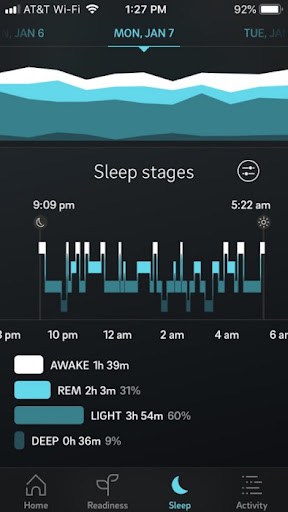
This is probably the most troublesome metric of them all.
NREM is massively important and a great indication of how efficient REM sleep is.
Now, don’t make the mistake of trying to focus on this one metric as you track sleep. You want to have “sleep balance” which I define as the optimal balance of all the sleep data.
In my experience, our clients will see improvements in REM prior to shifts in deep sleep when improving their sleep problems.
If you have low REM sleep
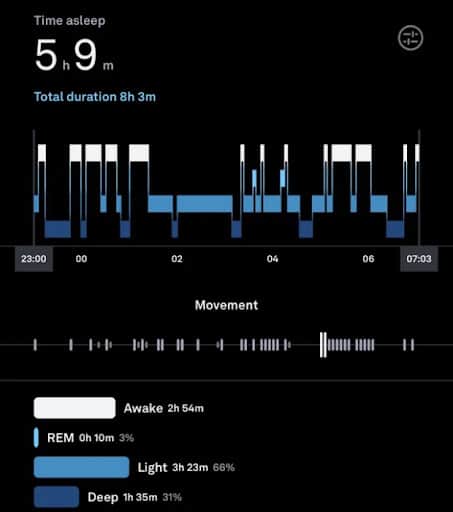
REM sleep is when your mitochondria in your brain are the most active and they perform a lot of important biological processes. Insufficient REM is a huge sign that your mitochondria are having issues. Hence we have our masterclass devoted to mitochondria. Check that out in the little video that popped up on this page or at the top of our website.
However, measuring time spent in REM is tricky because if REM is too high, that indicates you are sleep deprived and your body is compensating (sleep architecture is tricky).
Sleep Apnea and Oura Ring
The way oura ring performs blood oxygen monitoring is quite snazzy. It uses photoplethysmography (PPG) technology to detect small changes in your blood oxygen levels.
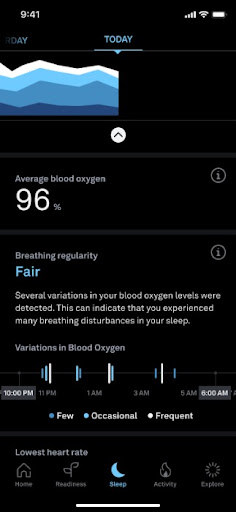
If you have sleep apnea, then this is a huge PLUS to get an oura ring. This will help you detect how often oxygen levels desaturate. Sleep apnea is a whole other monster and we won’t dive much deeper on that here
Sleep Disorders and Oura Ring
Overall, I would say the oura ring is good for those with onset insomnia and maintenance insomnia. Issues outside of those (bruxism, night terrors, etc.) have other confounding factors an oura ring isn’t going to track.
What are Sleep Stages and how are these measured?
Sleep stages refer to the different phases of sleep that a person goes through in a given night. These include light sleep, deeper sleep, and REM (rapid eye movement) sleep. Different activity trackers measure these stages in various ways, but the most common way is by measuring movement during each stage. The Oura Ring measures your body temperature by measuring your skin temperature.
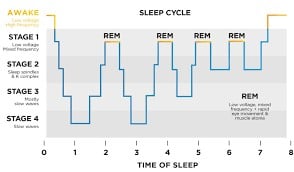
Oura ring has gotten a lot better at predicting where you are in your sleep cycle. However, don’t get so caught up in the pretty graphs here. The metrics you get above are a lot more actionable than looking at the sleep architecture.
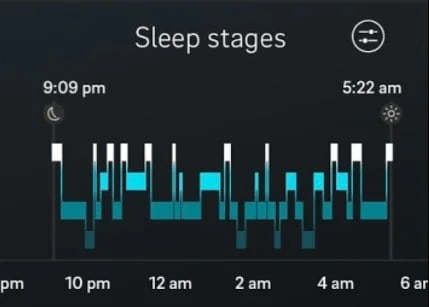
Readiness Scores, are you ready?
Oura also comes with a readiness score which represents how well your body is prepared for the day ahead. It’s based on factors such as how much sleep you got, how deep it was, and your resting heart rate. This is different from the score for sleep because it takes into account more than just sleep to determine how well you are prepared for the next day.
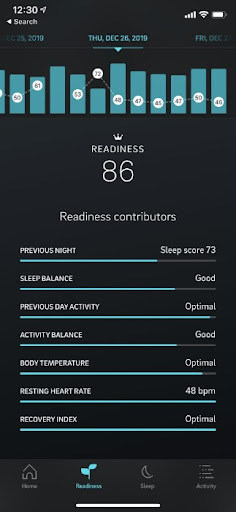
So, readiness scores are a great way to have an honest conversation with yourself on how much stress you want to impose on yourself throughout the day. Wellness reports like this give you a better holistic view of what’s going on.
However, just because you can “count it” on an oura ring doesn’t mean it “counts” in real life.
In my own personal experience, a readiness score can be “great” but you can still have massive issues. That’s because your readiness score depends heavily on HRV which is reliant on your autonomic nervous system.
If your autonomics are off, then a readiness score can actually be invalid when you’re having symptoms (brain fog, energy slumps, etc.).
The moral of the story here’s to never put too much into one single metric.
But what about my ring size?
Don’t fret, oura ring will send you a free sizing kit.
What is the Fitbit?
Fitbit is an activity tracker designed for monitoring steps taken, distance traveled, calories burned, active minutes, and daily goals achieved. It also features heart rate monitoring and can be used to log meals and track workouts. Like the Oura Ring, it has some basic sleep tracking capabilities like measuring how long you’ve been asleep and your overall quality of rest.
What makes fitbit different from other fitness trackers is that it allows for more detailed tracking of sleep. Many fitbit trackers include data on sleep stages, heart rate variability, and body temperature during sleep.
In short, think of fitbit trackers as a “fitness tracker” that has a hobby of helping with sleep. (Heck some fitbits come with guided sleep meditations)
Fitbit Fitness Trackers
Fitbit fitness trackers include a variety of models that are perfect for those looking to get started with tracking their sleep and activity. Some of the most popular trackers include the Inspire, Charge, and Sense. Each device has different features and capabilities, so it’s important to research which one is best suited for your goals.
Overall fitness trackers are designed to help users achieve their health and wellness goals. Fitness trackers make it easier to keep track of progress, motivate you to exercise more, and help you understand how your diet affects your overall well being.
In a way, fitness tracking devices allow you to gamify and have the satisfaction of numbers going up. Hence, fitness trackers bring your focus more
Now there are a few different fitbit trackers to highlight
Fitbit sense
The fitbit sense is one of the most advanced fitness trackers on the market. It offers features that can help you understand more about your health, such as stress management and skin temperature monitoring. The Fitbit Sense also includes advanced sleep tracking capabilities like REM sleep analysis and continuous heart rate monitoring heart rate variability measurements. And, for you heavy sweaters/swimmers, it’s water resistant.
Out of all the fitbit devices , the Sense is really the one that emphasizes sleep tracking with its innovative features (it even has a built in alarm).
Fitbit charge
The fitbit charge is a great choice for those who want a basic tracker with essential features like step counting, heart rate tracking, and sleep stages. You’re also able to track your active zone minutes.
Out of all the fitbit devices, the fitbit charge is the most affordable and offers the essential features to keep track of your basic health and wellness.
Fitbit inspire
The Fitbit Inspire is a great choice for those looking to track their activity, sleep and calories. It’s designed with beginner fitness enthusiasts in mind and comes with features like a swim proof design, step counting and calorie tracking.
Out of all the fitbit devices, the fitbit inspire is the most affordable and offers essential features like step counting, sleep tracking and calorie tracking for those who are just starting out with fitness. This one is also water resistant
Fitbit App
The Fitbit app all allows you to track your progress, store data from your device, and set goals. It also provides insights into your sleep habits and provides tips for improving them. You can even use the app to create customized workouts and receive feedback on how well you’re doing in real time.
The fitbit app is interactive and helps keep fitbit users engaged with their fitness journey. It serves as a great way to stay motivated, learn more about your body, and stay on top of your health goals.
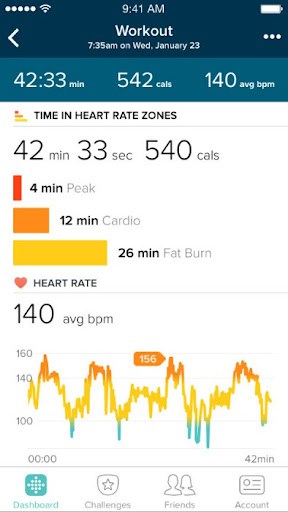
And, as a neat addition, fitbit is looking to become capable with google fit and the apple health app to expand the tracking capacities. So you can use the companion app for fitbit, or hook up with google fit or apple health to pool all your health data together.
Health tracking
Health tracking is becoming increasingly popular as people become more conscious about their health and try to improve their lifestyle. Health tracking is a term used to describe the practice of monitoring different aspects of your life, such as fitness, nutrition, sleep, mental health, etc., in order to gain insight into your overall well being.
How does the Fitbit work?
Fitbit monitors your steps taken each day and tracks activities like running or biking. It also records data from other physical activities such as swimming or weights. Additionally, it logs your sleep and can give you insights into how many hours of restful sleep were attained each night.
Unlike Oura ring, Fitbit predominantly tracks movement to determine sleep metrics. This makes fitbit less accurate than oura ring.
Health and Fitness tracking; they’re different
Health and fitness tracking are two different concepts.
Think of fitness as performance. You can perform well, but not necessarily be healthy.
And, you can be healthy, but not necessarily have a high level of performance.
The idea is to have BOTH hence fitness tracking capabilities (such as activity tracking) in addition to health metrics allow you to better balance this health vs fitness equation.
Why you need to know the difference between health and fitness
Fitness goals are great, don’t get me wrong.
However, sometimes you can get “fitness tracker crazy” and go overboard with numbers and metrics.
So, a fitness tracker can be a double edged sword.
Many folks, in the name of “trackable health,” will push themselves too hard when their nervous system and mitochondria need to rest. These metrics should be an outward reflection of your internal cellular capacity. That’s why we take a deep dive on those components (mitochondria and circadian rhythms) in our masterclass.
What are the benefits of using the Oura Ring vs. Fitbit? Which device is more accurate for sleep tracking?
Both oura ring and fitbit are decent rulers of sleep and activity.
Unlike fitbit, oura ring has a heavy emphasis on sleep and readiness for physical activity. Basically, oura ring is a “sleep tracker with a side of fitness” and fitbit is a “fitness tracker with a side if sleep”
So what’s the verdict on Oura Ring vs Fitbit?
Well, that depends on you and your goals.
If you are more focused on sleep, go with the oura ring.
If you are more focused on fitness, then go with a fitbit.
Now, before you run off to Amazon, you need to understand making data driven decisions
Data Driven Decisions
I’m a bit of a statistics snob.
Data is a tool to help you make better decisions.
However, you must be sure that the data you’re seeing is truly statistically significant.
This means the numbers must be different from each other outside of “chance” or “randomness”
In other words, your score going from 78 to 81 the same day you also ate 3 jelly beans was probably a random occurrence.
When people don’t recognize this, they get caught up in numbers that aren’t different.
The result of this is what I call “spaghetti on the wall sleep hacking” where you’re doing 9 different things every 3 weeks for non-significant changes in sleep or readiness scores.
And here’s the real kicker, significant differences in numbers do NOT equal physiologically significant changes for you. That is, a score of 80 vs 90 is very likely different…
But that may mean nothing for your underlying cellular health.
In the end this is not about “oura ring vs fitbit” it is about having a system to make better decisions with.
But, let’s play devil advocate and say you got AMAZING data from your tracker.
What are you going to do with that?
You’ll end up tinkering with supplements, exercise routines, and maybe a bubble bath 90 minutes before sleep.
But, here’s the thing, those are just band-aids that just treat the symptoms of the underlying issues with your mitochondria and circadian rhythms.
That’s what is at the core of your sleep issues.
If you aren’t aiming your interventions at those factors… then you’re missing the point.
So, this goes beyond oura ring vs fitbit. This is about being superficial on sleep vs getting to the deep core issues.
One of these will have a far bigger impact on your sleep quality and overall health.
So, make sure to check out my masterclass where we take a deep dive on how those factors are connected to your sleep!

Written By: Dylan Petkus, MD, MPH, MS
Dr. Dylan Petkus is on a mission to help people overcome their health issues like sleep apnea so they are not limited by their condition or trapped by options that don’t provide full resolution.
He earned his Master’s of Science in Physiology at Pennsylvania State University where he was awarded a research fellowship and was a peer-reviewed published author. He went on to earn both his Master’s in Public Health and Medical Degree from the University of Miami Miller School of Medicine. Thereafter, he specialized in Family Medicine to help patients on the front-line of chronic disease.
Having overcome his own health challenges, including sleep apnea, he strives to help empower others to live fuller, healthier lives.
